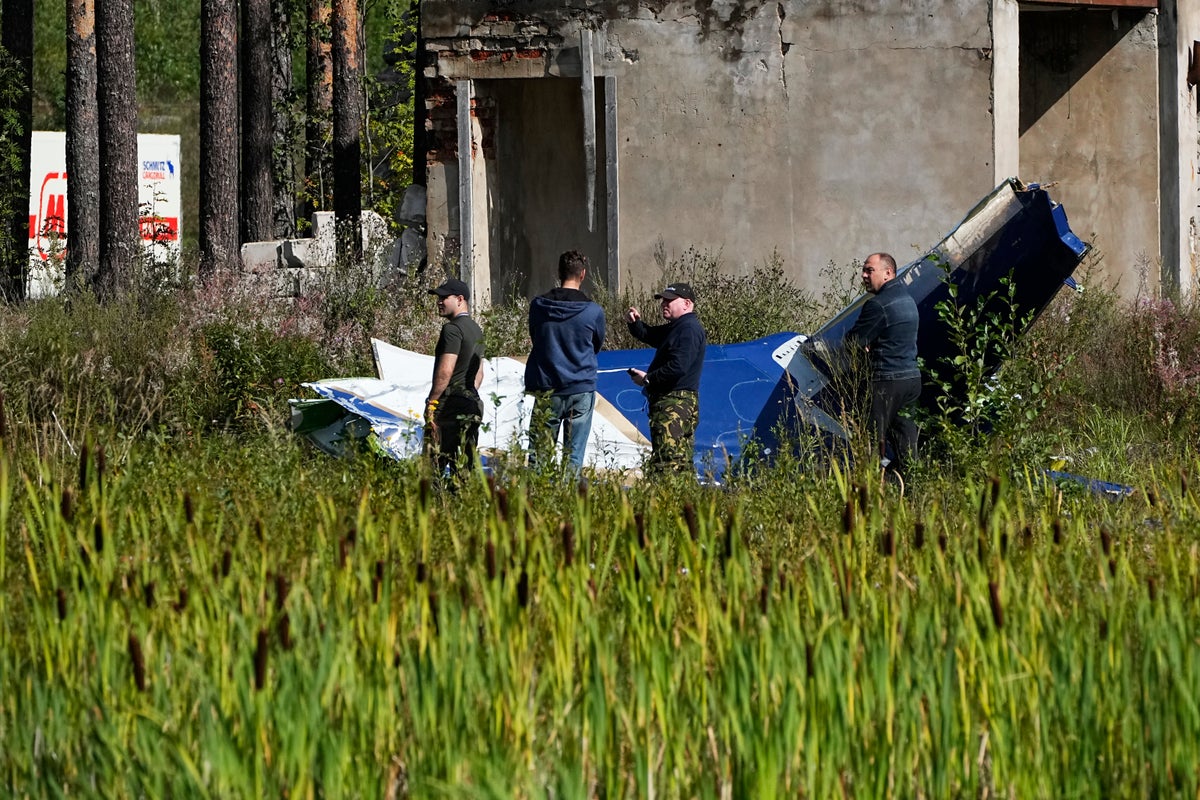
Britain's defense ministry said Friday that the presumed death of Russian mercenary leader Yevgeny Prigozhin in a plane crash could destabilize the Wagner Group, whose brutal fighters were feared in Ukraine, Africa and Syria and conducted a brief but shocking mutiny in Russia.
Prigozhin, who was listed among those on board, was eulogized Thursday by Russian President Vladimir Putin, even as suspicions grew that the Russian president was behind a Wednesday crash that many saw as an assassination.
Russian authorities have not yet confirmed Prigozhin’s death.
The British ministry wrote that “It is highly likely that he is indeed dead.” However, it noted that “he is known to exercise exceptional security measures.”
“The demise of Prigozhin almost certainly would have a deeply destabilizing effect on the Wagner Group. His personal attributes of hyperactivity, exceptional audacity, a drive for results and extreme brutality permeated Wagner and are unlikely to be matched by any successor,” the ministry wrote in a statement.
Wagner mercenaries were key elements of Russia’s forces in its war in Ukraine, particularly in the monthslong fight to take the city of Bakhmut, the conflict’s most grueling battle. Wagner fighters also have played a central role projecting Russian influence in global trouble spots, first in Africa and then in Syria.
A preliminary U.S. intelligence assessment concluded that the plane was downed by intentional explosion. One of the U.S. and Western officials who described the initial U.S. assessment said it determined that Prigozhin was “very likely” targeted and that the explosion falls in line with Putin’s “long history of trying to silence his critics.”
The officials, who spoke on the condition of anonymity because they were not authorized to comment, did not offer any details about what caused the explosion, which was widely believed to be vengeance for the mutiny in June that posed the biggest challenge to the Russian leader’s 23-year rule.
Pentagon spokesman Gen. Pat Ryder said there was “no information to suggest” that a surface-to-air missile took down the plane. He declined to say whether the U.S. suspected a bomb or believed the crash was an assassination.
The jet crashed Wednesday soon after taking off from Moscow, carrying Prigozhin, six other Wagner members, and a crew of three, according to Russia’s civil aviation authority. Rescuers found 10 bodies, and Russian media cited anonymous sources in Wagner who said Prigozhin was dead. But there has been no official confirmation.
President Joe Biden, speaking to reporters Wednesday, said he believed Putin was likely behind the crash.
“I don’t know for a fact what happened, but I’m not surprised,” Biden said. “There’s not much that happens in Russia that Putin’s not behind.”
The passenger manifest also included Prigozhin’s second-in-command, whose nom de guerre became the group's name, as well as Wagner’s logistics chief and at least one possible bodyguard.
It was not clear why several high-ranking members of Wagner, including top leaders who are normally exceedingly careful about their security, would have been on the same flight. The purpose of their trip to St. Petersburg was unknown.
Russian authorities have said the cause of the crash is under investigation.
In this first comments on the crash, Putin said the passengers had “made a significant contribution” to the fighting in Ukraine.
“We remember this, we know, and we will not forget,” he said in a televised interview with the Russian-installed leader of Ukraine’s partially occupied Donetsk region, Denis Pushilin.
Putin recalled that he had known Prigozhin since the early 1990s and described him as “a man of difficult fate” who had “made serious mistakes in life, and he achieved the results he needed — both for himself and, when I asked him about it, for the common cause, as in these last months. He was a talented man, a talented businessman.”
Russian state media have not covered the crash extensively, instead focusing on Putin’s Thursday remarks to the BRICS summit in Johannesburg via video link and Russia’s invasion of Ukraine.
Sergei Mironov, the leader of the pro-Kremlin Fair Russia party and former chairman of the upper house of the Russian parliament, said on his Telegram channel that Prigozhin had “messed with too many people in Russia, Ukraine and the West.”
“It now seems that at some point, his number of enemies reached a critical point,” Mironov wrote.
Numerous opponents and critics of Putin have been killed or gravely sickened in apparent assassination attempts, and U.S. and other Western officials long expected the Russian leader to go after Prigozhin, despite promising to drop charges in a deal that ended the June 23-24 mutiny.
Prigozhin was long outspoken and critical of how Russian generals were waging the war in Ukraine, where his mercenaries were some of the fiercest fighters for the Kremlin. For a long time, Putin appeared content to allow such infighting, but Prigozhin’s brief revolt raised the ante.
His mercenaries swept through the southern Russian city of Rostov-on-Don and captured the military headquarters there without firing a shot. They then drove to within about 200 kilometers (125 miles) of Moscow and downed several military aircraft, killing more than a dozen Russian pilots.
Putin first denounced the rebellion as “treason” and a “stab in the back," but soon made a deal that saw an end to the mutiny in exchange for an amnesty for Prigozhin and his mercenaries and permission for them to move to Belarus.
Now, many are suggesting the punishment has finally come.







